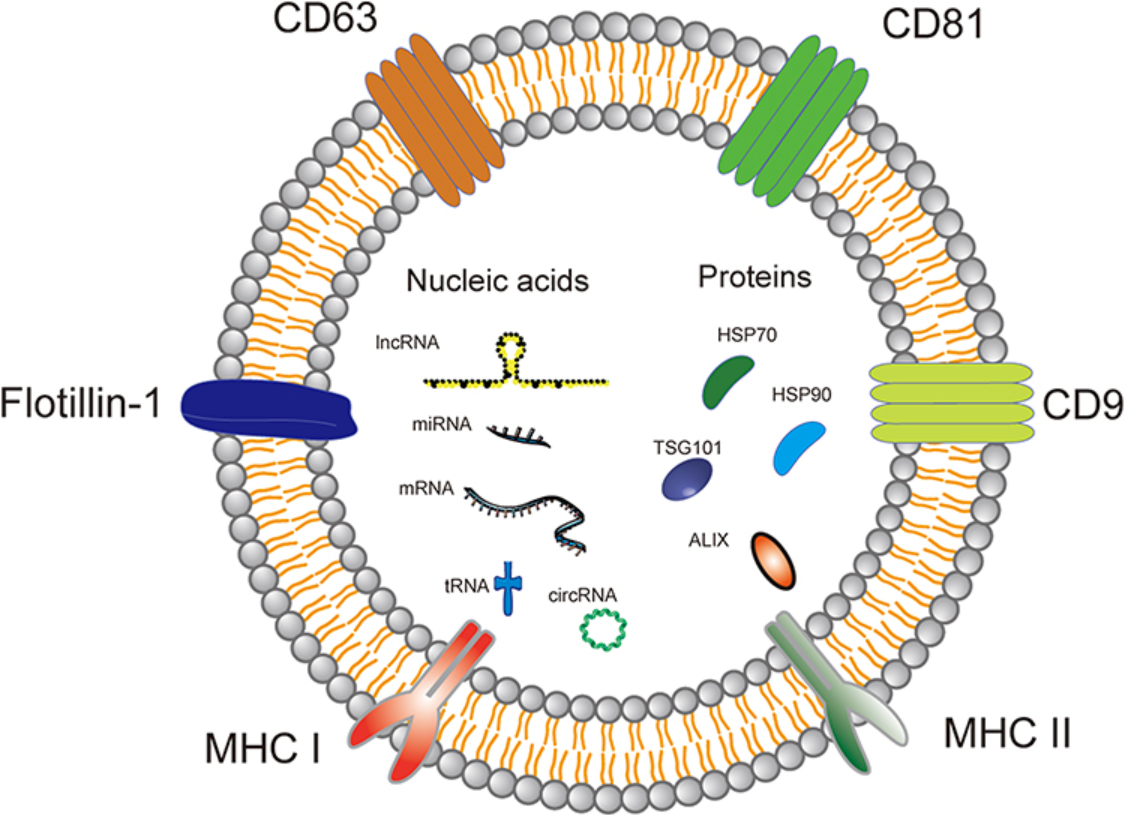Exosome Marker Analysis Service
- Animal tissues
- Plant tissues
- Microbial cultures
- Body fluids such as plasma, serum, urine, saliva, cerebrospinal fluid (CSF), and cell culture supernatants
- Purified exosome preparations
Exosomes are nanoscale extracellular vesicles secreted by virtually all cell types and are widely present in various body fluids, including blood, urine, saliva, tears, and cerebrospinal fluid. These vesicles carry a rich cargo of biomolecules such as proteins, lipids, and nucleic acids, which reflect the physiological or pathological conditions of their cells of origin. Exosomes play critical roles in intercellular communication by transferring their molecular contents between cells, thereby influencing a wide range of biological processes. Notably, exosomes derived from different cell types or tissues exhibit distinct molecular compositions and functional properties, which underscores their value as potential biomarkers for disease diagnosis, prognosis, and therapeutic monitoring.
A crucial step in exosome research is the accurate identification of exosomal markers, which distinguishes exosomes from other extracellular vesicles and contaminants. The most widely accepted exosomal markers include the tetraspanins CD63, CD9, and CD81, which are integral membrane proteins involved in vesicle formation and trafficking. In addition, proteins such as TSG101, HSP70, and ALIX are frequently detected and serve as hallmark components of the endosomal sorting complex required for transport (ESCRT) pathway and stress response systems.

Figure 1. The Composition and Typical Markers of Exosomes
Service at MtoZ Biolabs
MtoZ Biolabs offers professional Exosome Marker Analysis Services to support exosome characterization and quality control across a variety of research and clinical applications. With expertise in extracellular vesicle biology and advanced analytical platforms, we provide end-to-end solutions tailored to your sample type and project objectives. Our service includes comprehensive profiling of key exosomal protein markers such as CD63, CD9, CD81, TSG101, ALIX, and HSP70. Depending on your needs, we offer multiple detection strategies including Western blotting, ELISA, flow cytometry, and mass spectrometry-based proteomics, each optimized for accuracy, sensitivity, and reproducibility.
Whether you are verifying exosome isolation, comparing marker expression across conditions, or validating exosome purity, MtoZ Biolabs delivers high-quality, data-rich outputs to support confident downstream applications. Clients simply provide qualified samples, and our experienced technical team handles the entire analytical workflow—from experimental design and marker detection to data interpretation and customized reporting.
Analysis Workflow
1. Sample Receipt and Quality Assessment
Evaluate sample integrity and concentration to ensure suitability for downstream analysis.
2. Exosome Isolation (Optional)
If requested, exosomes are isolated using ultracentrifugation, size exclusion chromatography, or affinity-based kits.
3. Marker Detection
Analyze canonical exosome markers using techniques such as Western blotting, ELISA, flow cytometry, or LC-MS/MS.
4. Data Processing and Validation
Perform signal quantification, normalization, and quality checks to confirm exosomal identity and purity.
5. Customized Report Delivery
Provide a detailed report including raw data, processed results, interpretation, and method documentation.
Service Advantages
☑️Flexible Analytical Platforms: Multiple detection options available, including Western blot, ELISA, flow cytometry, and mass spectrometry, tailored to specific research needs.
☑️High Sensitivity and Specificity: Optimized protocols and validated reagents ensure reliable detection even in low-abundance samples.
☑️Expert Technical Support: Guidance from sample preparation to data interpretation, backed by a team with extensive exosome research experience.
☑️One-Stop Service: End-to-end services from exosome isolation to marker validation, all in one place, with customizable workflows for diverse sample types.
Sample Submission Suggestions
1. To ensure optimal results for exosome marker analysis, we recommend submitting high-quality, freshly isolated or properly stored samples. Accepted sample types include but not limited to:
2. Samples should be stored at –80°C and shipped on dry ice to maintain integrity.
For specific requirements or assistance, please contact us in advance.
Deliverables
1. Comprehensive experimental details
2. Raw data files (e.g., WB images, MS spectra)
3. Quantified expression levels of key exosome markers
4. Processed results and summary tables
5. High-resolution images
6. Customizable analysis report tailored to project requirements
Related Services
Exosome Separation & Purification Service
Exosome Characterization Service
How to order?







